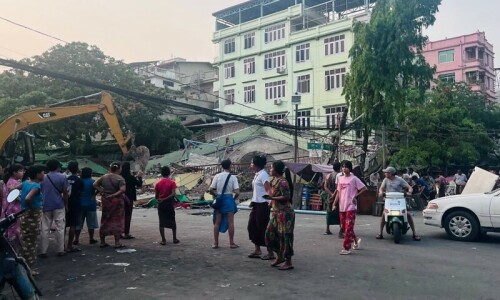LAHORE: After gaining full control of Miramshah, army troops entered Mirali, the second largest town of North Waziristan, on Monday night and killed six terrorists, including an important Taliban leader Matiullah.
This was announced on Tuesday by ISPR Director General Maj Gen Asim Salim Bajwa in a media briefing in Lahore on the Zarb-i-Azb operation.
“We have killed Chechens in Miramshah and are fighting all kinds of terrorists, including foreign elements, in Mirali. We are eliminating terrorists of all hue and colour to protect Pakistan,” he said when asked who were the target of the operation – “good or bad Taliban”.
The ISPR chief denied reports that civilians were killed during the operation and said: “All civilians were evacuated before the start of the operation. Therefore, there is no chance of any civilian casualty in the operation which has full support of the political government and the entire nation.”
ISPR says Taliban leader Matiullah among six killed
He also rejected claims that the main Taliban leadership had fled to Afghanistan and said the leaders had been hiding there before the operation was launched. “It was hard to escape after the army besieged North Waziristan.”
He said that two of the six terrorists killed were suicide bombers who blew themselves up when troops encircled them.
 |
| LAHORE: ISPR Director General Asim Bajwa talking to media personnel about the progress of the military operation in North Waziristan here on Tuesday.—White Star |
The army started clearing Mirali’s central market on Monday night amid resistance by terrorists. “We have also started clearing the nearby Boya area.”
About 447 terrorists have been killed and 88 militant hideouts destroyed since the army launched the operation on June 15. Twenty-one terrorists have surrendered to troops in Miramshah and 11 in Mirali. Twenty-six army personnel, including officers, have lost their lives and 80 suffered injuries, according to the ISPR chief.
He said that Miramshah, the administrative headquarters of North Waziristan and a stronghold of Taliban, had been cleared and was under army control. Troops have seized a large quantity of weapons and explosives. But there was still some resistance in the suburbs, he added.
Maj Gen Bajwa claimed that even IEDs (improvised explosive devices) were being sold in a market in Miramshah. Taliban used to publicly execute people outside a shop in the main bazaar and named it “Man-eaters’ Bazaar”.
Troops seized a bullet-proof jeep and an Afghan police vehicle.
“The area is heavily mined and a newly raised division of army engineers is clearing them. They are also defusing IEDs. The quantity is immense and, therefore, care is necessary to handle them to avoid casualties,” he said.
He indicated that it would take some time for internally displaced persons to return to their homes.
The ISPR chief said foreign involvement could not be ruled out in North Waziristan in view of the presence of foreign terrorists and a large quantity of arms and ammunition recovered from there.
Answering a question, he said he was dissatisfied with the support extended by Afghanistan to eliminate or hand over terrorists having taken refuge there. “We have been requesting it (Afghanistan) to do the needful, but the recent cross-border attack on Bajaur Agency in which three army personnel, including a captain, lost their lives is indicative of Kabul’s response to our requests,” he said.
Maj Gen Bajwa said the army was considering different options, including fencing the border with Afghanistan, to stop infiltration of terrorists.
He said the operation was aimed at eliminating terrorists. “The army and the political government have decided to uproot them and ensure that they don’t reassemble.”
He said all institutions would have to join hands in the efforts because terrorists could attack settled areas of the country. Ten joint control rooms have been set up across the country to coordinate action against the fleeing Taliban or their sleeper cells in cities.
The ISPR chief asked people to contact these centres on UAN 1135 if they see any suspected person in their areas.
He pointed out that there was a discrepancy in the number of registered IDPs and the population of North Waziristan. He said the latest census suggested that the agency’s total population stood at 400,000, but the number of registered IDPs was about 900,000. “We are rechecking the figures to find out if there were double entries.”
Maj Gen Bajwa said all IDPs were being looked after properly, adding that only NGOs with security clearance had been allowed to provide relief goods to IDPs. No proscribed outfit has been allowed to carry out relief work there.
He said the army would maintain its hold over the recovered North and South Waziristan agencies and later hand them over to the civilian government.
Published in Dawn, July 16th, 2014















































